In today’s ultra-competitive restaurant industry, the most successful establishments are those that leverage the full potential of first-party guest data.
Gone are the days when just serving good food was enough to keep the doors open and the tables full.
Now, using Artificial Intelligence (AI) to analyze guest data has become a game-changer, revolutionizing restaurant marketing, boosting revenue, and enhancing guest satisfaction like never before.
Here we will look into how utilizing AI for restaurants can transform raw data into actionable insights.
Whether it’s personalized marketing strategies that resonate with your target audience or operational tweaks that suit the tastes of your frequent guests, AI helps you make decisions rooted in data-driven reality.
Learn how to propel your restaurant into the future by turning guest data into your most valuable asset.
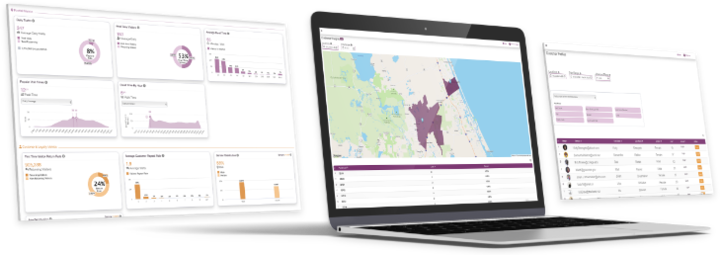
Collecting Guest Data
To achieve a comprehensive understanding of your guests, collecting data from multiple sources is crucial. This strategy allows you to create a 360-degree view of each guest, often referred to as a single customer view.
With this all-encompassing perspective, you can make intelligent, data-driven decisions that will elevate both your marketing strategies and overall business performance.
WiFi Logins
When guests log in to your restaurant’s WiFi network, you have an immediate opportunity to collect basic information such as email addresses and social media profiles.
This data not only enables you to understand who is visiting your restaurant but also opens up direct channels for targeted marketing.
Online Ordering
Online ordering platforms are treasure troves of data. From the types of meals frequently ordered to the average spend per order, this information lets you refine your menu offerings and promotions to align with guest preferences.
Online Reservations
Reservation systems often capture essential details like dining preferences, special occasions, and past visits. This data enables you to personalize your guests’ dining experiences, making it more likely that they’ll return and even become loyal patrons.
Point of Sale (POS) Systems
Your POS system does more than just process transactions, it holds key behavioral data. From the frequency of visits to the average amount spent per visit, leveraging this information can help you create tailored promotions and loyalty programs that actually resonate with your guests.
Website Forms
Website inquiry forms, newsletter sign-ups, and feedback surveys provide you with qualitative data that goes beyond numbers. You can gather insights into what guests are specifically interested in, what they like or dislike, and what suggestions they may have.
By combining data from these diverse sources into a restaurant customer data platform, you can create a full, 360-degree view of your guests.
This empowers you to make data-driven decisions that improve guest satisfaction, optimize marketing campaigns, and ultimately, increase revenue.
With the help of AI technologies to analyze this multifaceted data, you’re better equipped than ever to meet your guests’ expectations and drive your restaurant’s success.

Leveraging a Customer Data Platform for Efficiency and Insight
As restaurants grapple with data from multiple sources like WiFi logins, online reservations, and POS systems, the challenge often lies in consolidating this fragmented information into a unified view.
That’s where a Restaurant Customer Data Platform (CDP) comes into play. A CDP aggregates all your guest data into one centralized platform, making it easier to manage, analyze, and put to good use.
Time-Saving Automation
One of the immediate benefits of using a CDP is automation. Manually sifting through data to find useful patterns is not just tedious, it’s also time-consuming and prone to error.
A CDP automates these tasks. It collects and sorts data from multiple sources in real-time, allowing you to focus on other aspects of running your restaurant.
Resource Optimization
Time is money, especially in the restaurant business where margins can be thin.
By automating the data collection and preliminary analysis, a CDP frees up your team’s time to engage in more value-added activities.
Whether it’s fine-tuning your operations based on guest preferences and behavior, or crafting personalized marketing campaigns, your team can invest their efforts where it matters most, thanks to the groundwork laid by the CDP.
AI-Driven Actionable Insights
What truly sets a CDP apart is its ability to use AI technology. With all your guest data compiled in one place, AI algorithms can efficiently analyze this information to generate actionable insights.
Whether you want to identify guests who have stopped visiting, pinpoint slow service areas, or understand the peak times for reservations, AI provides you with specific recommendations based on data, not guesswork.
In summary, implementing a CDP in your restaurant can be a transformative step. Not only does it save time and optimize resources, but it also paves the way for AI to generate data-driven restaurant marketing strategies that can significantly improve guest satisfaction and revenue.
Adopting a CDP thus becomes more than just a technological choice, it’s a smart business decision.

The Importance of Clean, Verified Guest Data for AI
In the realm of Artificial Intelligence, the saying “garbage in, garbage out” holds particular weight. The quality of insights generated by AI is directly proportional to the quality of the data fed into it.
That’s why having clean, verified guest data is not just beneficial—it’s essential.
Avoiding Misleading Insights
Dirty or inaccurate data can lead to misleading conclusions. For instance, duplicate guest profiles, outdated email addresses, or incorrect birth dates can skew the AI’s analysis, pushing you to make decisions based on flawed information. In such cases, even the most advanced AI algorithms can’t correct for poor data quality.
Enhancing Personalization
One of the most powerful applications of AI in restaurant marketing is the ability to create highly personalized experiences for guests. To accomplish this, you need precise, verified data. Any inconsistencies or inaccuracies can result in off-target marketing, like sending non-vegetarian promotional offers to vegetarian guests, thereby eroding trust and satisfaction.
Streamlining Operational Efficiency
AI can also optimize behind-the-scenes restaurant operations, such as inventory management and staffing. However, to be effective, the AI system needs reliable, accurate data. Unclean data can result in overstaffing during slow periods or understocking popular menu items—mistakes that can cost time and resources.
Improving Revenue Forecasting
For any restaurant, projecting revenue and growth is crucial for long-term planning. AI can analyze past and current data to make incredibly accurate forecasts. But if the data is not clean, the AI’s predictions won’t be either, and you could end up making significant business decisions based on incorrect projections.
Data Verification as an Ongoing Process
It’s important to recognize that data cleaning isn’t a one-time activity; it’s an ongoing process. Regularly updating and verifying your guest data ensures that your AI tools function optimally and generate insights that are both reliable and actionable.
For AI to be a truly valuable asset in improving guest satisfaction, optimizing marketing efforts, and increasing revenue, the data it uses must be clean and verified. Investing in data hygiene is, therefore, not just a maintenance task—it’s a foundational step towards making the most of your AI capabilities.
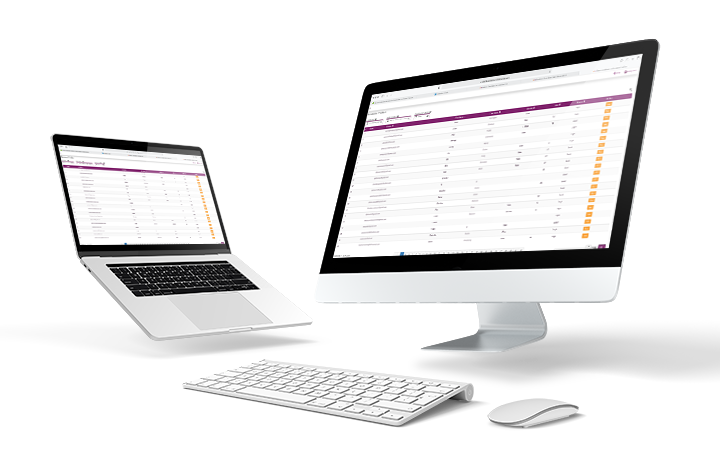
Real-Time Sentiment Analysis Using AI
One of the most transformative ways AI can impact your restaurant is through real-time restaurant customer sentiment analysis. By aggregating and interpreting guest behavior data alongside online reviews, AI provides you with an immediate, comprehensive snapshot of guest sentiment.
This real-time feedback enables you to make quick, data-driven decisions to enhance the guest experience continuously.
Harnessing Guest Behavior Data
When you look at guest behavior data—such as menu choices, time spent at the restaurant, and frequency of visits—you get valuable indicators of satisfaction or dissatisfaction. For example, a drop in frequent visits from a regular guest could signal dissatisfaction that you may need to investigate further.
Analyzing Online Reviews
Online reviews are essentially public report cards for your restaurant. While reading every review across multiple platforms can be overwhelming, AI can sift through all of this information rapidly.
It can pick up on recurring themes, whether positive or negative, giving you a more nuanced understanding of guest sentiment.
The Power of Real-Time Analysis
What makes this even more impactful is the real-time aspect. Traditional methods of assessing guest sentiment usually involve sifting through data and reviews manually, a process that can be time-consuming and reactive rather than proactive.
With AI, the moment new data comes in, whether it’s an online review or updated guest behavior data, it’s analyzed instantly.
This allows you to take immediate action, such as rectifying a service issue or capitalizing on a positive trend, to ensure your guests’ experience remains exceptional.
Making Quick, Informed Decisions
Let’s say multiple reviews mention slow service during the lunch hour rush. AI can flag this issue in real-time, allowing you to quickly adjust staffing levels or streamline the lunch menu.
In a landscape where guest expectations are constantly evolving, the ability to adapt quickly is invaluable. Real-time sentiment analysis through AI equips you with the tools to make rapid, informed decisions that can significantly elevate the guest experience, foster loyalty, and ultimately drive revenue growth.
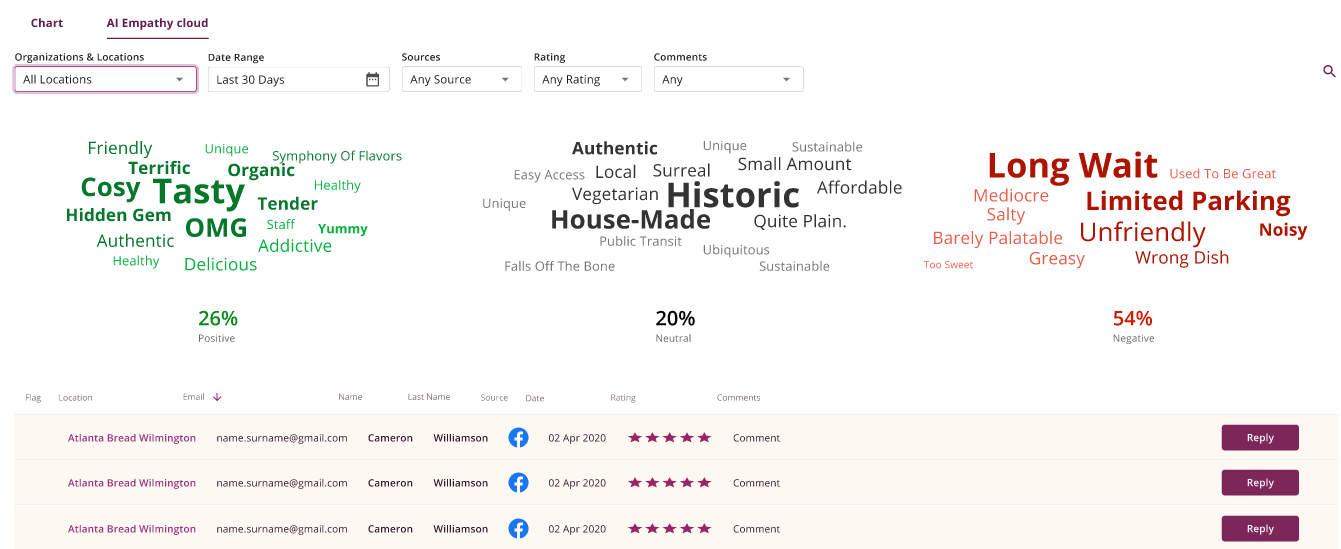
Turning Insights into Action with Guest Data and AI
In an industry as competitive and dynamic as the restaurant business, the margin for error is slim. Understanding your guests at a granular level can give you a significant edge.
With a wealth of guest insights and real-time sentiment analysis at your fingertips, you can make impactful changes that not only meet but exceed guest expectations.
Here’s how having these invaluable data points can substantially improve your restaurant business.
Personalized Marketing
Generic marketing campaigns rarely make an impact. With detailed guest profiles, you can create personalized marketing initiatives that genuinely resonate.
From special offers on favorite dishes to targeted promotions for special occasions like birthdays or anniversaries, personalization enhances engagement and increases the likelihood of repeat visits.
Improved Operational Efficiency
Guest insights can also offer a window into the operational aspects of your restaurant that may need attention. Is the wait time for a table affecting guest sentiment? Are certain times of the day understaffed?
Using data to identify these bottlenecks enables you to allocate resources more efficiently, improving both service speed and quality.
Enhancing Guest Experience
Real-time sentiment analysis can act as an early warning system for potential issues. Whether it’s a service hiccup or an unsatisfactory meal, immediate feedback allows you to correct course on the spot, turning a potentially negative guest experience into a positive one.
Strategic Growth Planning
The value of understanding your guest base and their sentiments extends beyond day-to-day operations; it’s also instrumental in strategic planning. Are you considering expanding your restaurant or adding a new service like catering? Historical data and sentiment trends can guide you in making decisions that align with your guests’ needs and preferences.
Building Long-Term Guest Loyalty
At the core of all these improvements is the goal of building long-term guest loyalty. Satisfied guests are not only likely to return but are also more inclined to become brand advocates who recommend your restaurant to others.
This word-of-mouth marketing is invaluable and comes at no additional cost to you.
Leveraging guest insights and AI isn’t just about collecting data; it’s about using that data to make informed, strategic decisions that improve every aspect of your restaurant business.
From the menu and marketing to operations and long-term planning, data-driven insights are the key to staying competitive and ensuring your restaurant not only survives but thrives.
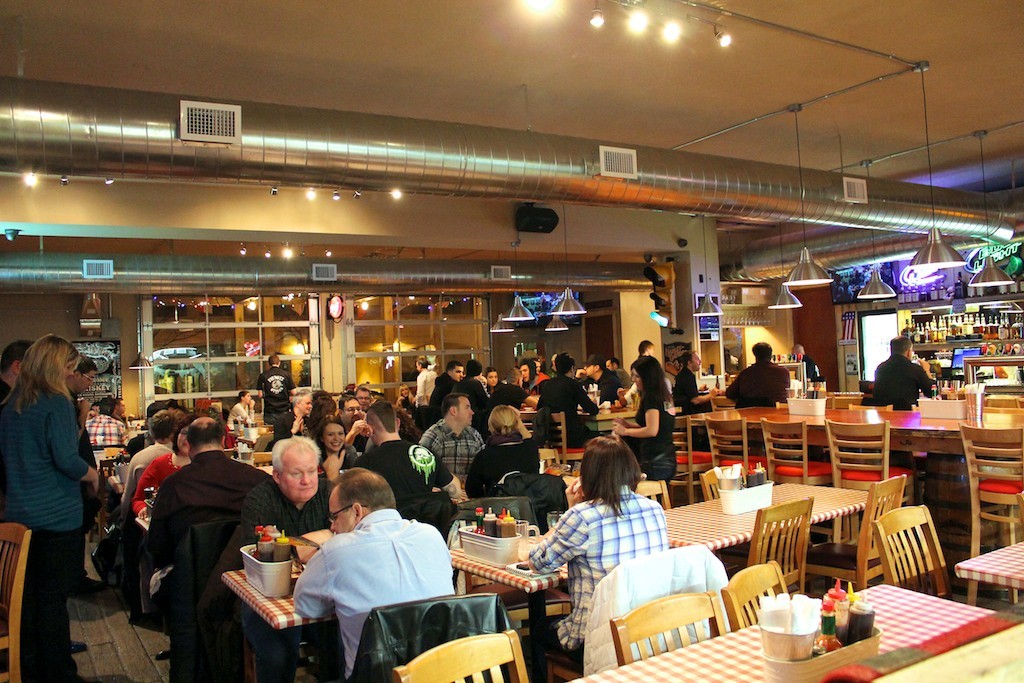
Conclusion: The Power of Data and AI to Transform Your Restaurant Business
The restaurant landscape is shifting, propelled by evolving consumer expectations and rapid technological advancements. In this fast-paced environment, staying ahead means more than just keeping up; it requires leveraging every tool and insight at your disposal to deliver an unparalleled guest experience.
As we’ve explored in this article, utilizing Artificial Intelligence to analyze robust, clean, and verified guest data offers an unmatched advantage.
From creating a 360-degree view of your guests to real-time sentiment analysis, the integration of AI with a centralized data platform provides actionable insights that can redefine your restaurant’s success.
It empowers you to fine-tune your menu, personalize marketing campaigns, improve operational efficiency, and make quick, informed decisions that elevate the guest experience. More than just streamlining operations, these insights and adaptations cultivate long-term loyalty, turning occasional guests into lifelong advocates for your brand.
In summary, investing in AI and data analytics isn’t just a trend, it’s the future of the restaurant industry. It’s not merely about technology for technology’s sake but about harnessing this powerful tool to make meaningful, lasting connections with your guests.
As you consider the next steps for your restaurant, remember that the key to unlocking unparalleled growth and guest satisfaction lies in the effective use of guest data through AI.
Take that step, and watch your restaurant not just adapt to the future, but shape it.
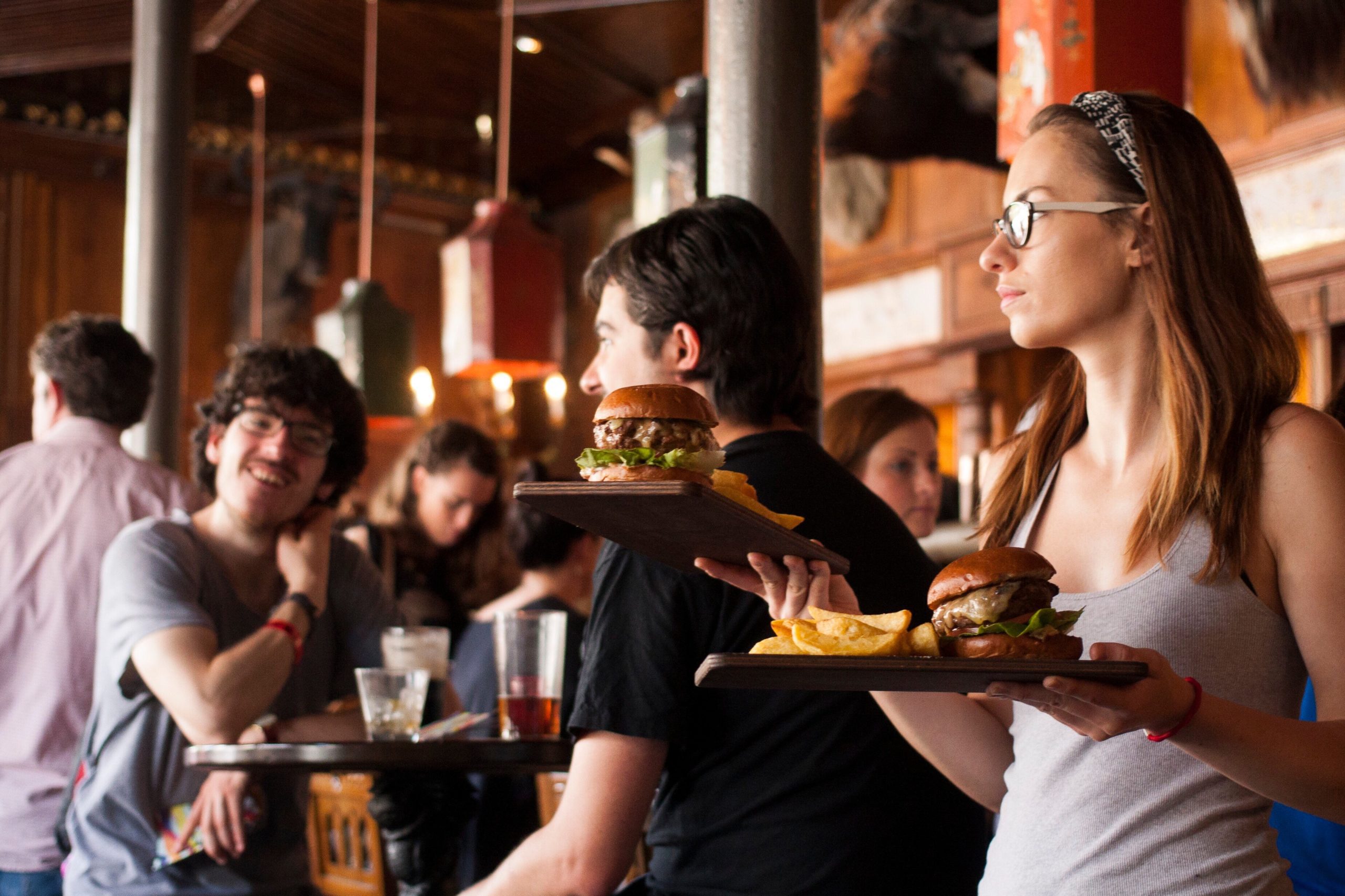
Discover Bloom Intelligence
Bloom Intelligence is an AI-powered restaurant marketing platform that includes a powerful customer data platform, automated data collection, marketing automation, and reputation management tools.
Guest data is collected from many different sources and aggregated into one single platform, making it simple and easy to analyze and segment your restaurant’s guest personas for your restaurant email marketing.
Data is collected from sources like WiFi logins, online reservation systems like OpenTable, online ordering platforms like Oracle’s GloriaFood or Toast, POS systems, website forms, and more.
Bloom makes guest data collection effortless, allowing you to quickly execute the strategies listed above, saving you time, increasing customer lifetime values, attracting new guests, improving your reputation, and boosting your bottom line.
Click Here to Schedule a Free Online Demo, or call Click To Call 727-877-8181 to see how we can help you save time and drive tangible results for your restaurants.




.svg)